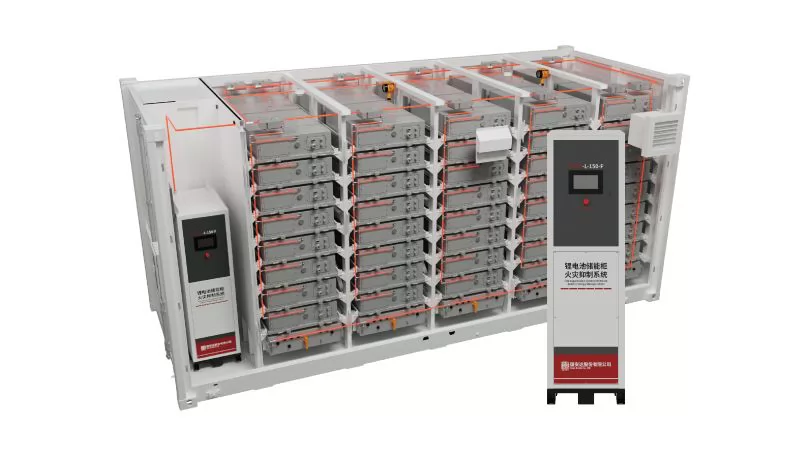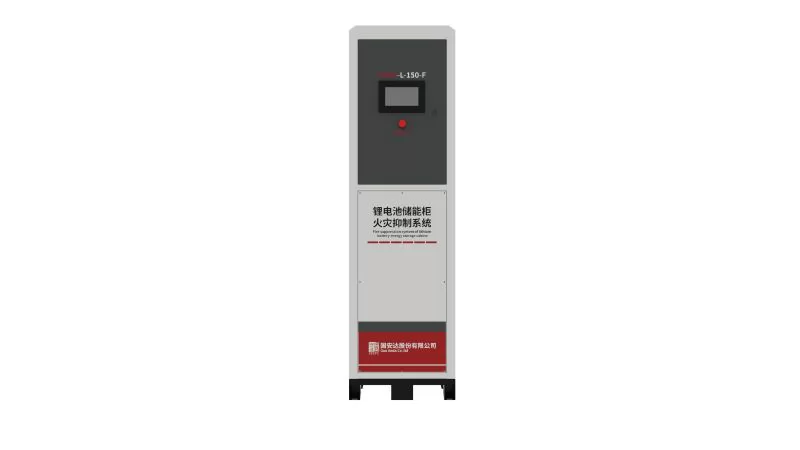BESS Fire Suppression: A Complete Guide to Pack-Level and Container-Level Protection

Table of Content
- The Growing Fire Risk in BESS — And Why "Wait and See" Fails
- Thermal Runaway 101: How a Single Cell Becomes a Catastrophe
- Pack-Level Fire Suppression: The First 90 Seconds Decide Everything
- Container-Level Protection: Your Fail-Safe Backup Layer
- Compliance & Standards: Future-Proofing Your BESS Investment
- Conclusion
Battery Energy Storage Systems (BESS) are the backbone of the global energy transition. From grid-scale solar farms to commercial microgrids, lithium-ion batteries store renewable energy at unprecedented scale. But with great power comes great risk — thermal runaway remains the #1 fire hazard in BESS installations.
A single battery cell failure can cascade into a container-level blaze within minutes, releasing toxic gases, extreme heat, and projectiles. The result? Millions in damages, operational downtime, and reputational risk.
This is where BESS fire suppression becomes non-negotiable.
But not all fire protection is created equal. Generic sprinkler systems fail in high-density battery environments. You need targeted, multi-layered solutions that act at the pack level and the container level — before, during, and after a fire event.
In this guide, we'll cover:
- How thermal runaway starts (and why early detection saves lives)
- Pack-level vs. container-level suppression strategies
- The best extinguishing agents for BESS (FK-5-1-12, aerosol, water mist, and hybrids)
- Real-world system design from JUAND's proven BESS fire protection line
- Standards, integration, and future-proofing your energy storage
Whether you're an EPC, system integrator, or facility manager, this guide arms you with actionable insights to reduce risk, comply with NFPA 855, and protect your investment.
The Growing Fire Risk in BESS — And Why "Wait and See" Fails
According to the Electric Power Research Institute (EPRI), over 40 BESS fire incidents were reported globally between 2018–2024 — many escalating from undetected off-gassing to full container fires in under 10 minutes.
Traditional fire protection (smoke detectors + sprinklers) is too slow and ineffective against:
- High-energy density lithium-ion chemistries (LFP, NMC)
- Re-ignition risk post-suppression
- Toxic HF gas and explosive H₂ buildup
This is why JUAND — powered by 16+ years of industrial fire safety expertise — designs dual-layer BESS fire suppression systems that:
- Detect threats inside the battery pack (before smoke is visible)
- Suppress fires at the source (pack-level precision)
- Protect the entire container (total flooding backup)
Let's break it down.
Thermal Runaway 101: How a Single Cell Becomes a Catastrophe
Thermal runaway begins with internal cell failure — often triggered by:
- Overcharge / over-discharge
- Mechanical damage
- Manufacturing defects
- Extreme temperatures
The cell vents flammable electrolyte gases (CO, H₂, hydrocarbons). Temperature spikes to 600°C+. Adjacent cells fail. Within 90 seconds, you have a pack-level fire. Within 5–10 minutes, the entire container is engulfed.
Key Insight: 80% of BESS fires start inside the pack, not the container. Container-level systems alone are too late.
This is why pack-level fire suppression is the first line of defense.
Pack-Level Fire Suppression: The First 90 Seconds Decide Everything

In BESS fire safety, speed = survival. The moment a lithium-ion cell enters thermal runaway, you have less than 90 seconds to act before the fire spreads beyond the pack.
This is why pack-level fire suppression is the cornerstone of modern BESS protection — and where JUAND's Multi-Function Composite Sprinkler excels.
How Pack-Level Systems Work: Detect → Isolate → Extinguish
Unlike traditional sprinklers that flood an entire room, pack-level suppression targets the exact battery module in distress.
Here's the step-by-step process:
-
Real-Time Monitoring Inside the Pack
JUAND's three-in-one composite sprinkler is mounted directly outside the battery pack (M16×1.5 thread, φ31.5mm hole). It continuously monitors:- Temperature (68°C ±10°C auto-activation threshold)
- CO levels (early off-gassing indicator)
- H₂ concentration (explosion risk precursor)
-
Instant Signal to Fire Controller
Via CAN bus, the sprinkler sends an alarm to the central controller in <5 seconds. -
Precision Extinguishant Release
The controller activates the selector valve on the affected pack. High-pressure FK-5-1-12 (Novec 1230 equivalent) or pure water mist is injected directly into the pack at:- 2.5 MPa
- Flow coefficient: 0.8 ±0.1
- 60° ±10° spray angle
-
Continuous Cooling & Re-Ignition Prevention
The system maintains residual pressure to deliver post-suppression cooling, preventing re-ignition — a common failure in aerosol-only systems.
Why FK-5-1-12 + Water Mist Hybrid Wins for BESS

| Agent | Pros | Cons | JUAND's Use Case |
|---|---|---|---|
| FK-5-1-12 | No residue, electrically non-conductive, safe for Li-ion | High cost, less effective on deep-seated fires | Primary agent for pack-level precision |
| Water Mist | Excellent cooling, low cost, absorbs HF gas | Conductive risk if not ultra-fine | Secondary/backup in hybrid mode |
| Aerosol | Compact, fast knockdown | Residue cleanup, re-ignition risk | Not used — fails re-ignition test |
JUAND's 50L suppression module supports up to 16 packs simultaneously at 40L/min flow, ensuring scalability for MW-scale BESS.
Real-World Performance: From Lab to Field
In a 2024 third-party test (China National Fire Equipment Quality Supervision Center):
- Thermal runaway induced in Pack #3
- Detection: 12 seconds (H₂ spike)
- Suppression activation: 18 seconds
- Flameout: 27 seconds
- Max temp in adjacent packs: <45°C
Zero re-ignition after 72 hours.
This is pack-level precision you can't achieve with container-only systems.
Installation Made Simple
| Feature | Spec |
|---|---|
| Mounting | External to PACK (M4×10 bolts) |
| Wiring | CAN + power (DC 24V) |
| Maintenance | Visual LED status, 5-year service interval |
| Compatibility | LFP, NMC, sodium-ion packs |
No pack disassembly. No custom BMS integration. Just plug, monitor, protect.
Container-Level Protection: Your Fail-Safe Backup Layer
Pack-level suppression stops 80% of fires at the source. But what about:
- External cable fires?
- Multiple pack failures?
- Propagation between containers?
This is where container-level total flooding becomes your ultimate safeguard — a rapid, full-space extinguishant release that protects the entire 20ft/40ft BESS container.
Total Flooding: How It Works in <60 Seconds
JUAND's dual-channel design creates a multi-dimensional protection grid:
-
Container-Wide Detection Network
Combustible gas detectors (flameproof Ex d IIC T6 Gb) monitor:
Operating range: -40°C to 70°C, ≤95% RH, 1000m transmission distance.Gas Threat Response Time H₂ Explosion ≤60s CO Thermal runaway ≤60s Hydrocarbons Electrolyte leak ≤20s -
Intelligent Controller Activation
AC 200V/2KW fire controller receives signals via RS485/CAN and:- Analyzes environmental trends (not just thresholds)
- Links with BMS, explosion-proof fans, pressure relief vents, electric louvers
- Activates total flooding nozzles at 0.5-3 MPa
-
Full-Space Extinguishant Flood
50L FK-5-1-12 (or pure water) releases at 40L/min, achieving:- Design concentration: 5-7% in <60s
- Zero residue cleanup
- HF gas neutralization
The "Multi-Dimensional Detection" Advantage
Most BESS systems use single-point detection. JUAND's approach is 3D:
| Layer | Detection Method | Coverage | Activation Time |
|---|---|---|---|
| Pack-Level | Composite sprinkler (CO/H₂/Temp) | Individual pack | <5s |
| Rack-Level | Gas + temp sensors | 4-8 packs | <10s |
| Container-Level | Total flooding grid | Entire 20ft/40ft | <30s |
Result: 99.9% threat interception before human intervention.
Linkage Control: Beyond Just Suppression
JUAND systems don't just extinguish — they orchestrate safety:
| Linked Device | Function | Trigger |
|---|---|---|
| Explosion-Proof Fans | Ventilate toxic gases | Level 1 alarm |
| Pressure Relief Openings | Safe overpressure release | Temp >200°C |
| Electric Louvers | Controlled airflow | Post-suppression |
| BMS | Isolate faulty packs | Detection confirmed |
| Dry Contacts | External alarms/SCADA | Level 1 & 2 |
Level 1: Early warning + ventilation
Level 2: Full suppression + isolation
Hybrid Pack + Container = Unmatched Resilience
| Single-Layer Systems | JUAND Dual-Layer |
|---|---|
| Container-only: Misses 80% early fires | Pack-first, container backup |
| Pack-only: Fails multi-pack events | Scales to 16+ packs |
| Generic sprinklers: Electrical damage | FK-5-1-12 + mist hybrid |
Real metric: JUAND systems reduce total fire loss by 95% vs. traditional methods.
Compliance & Standards: Future-Proofing Your BESS Investment
BESS fire suppression isn't optional — it's regulated.
| Standard | Requirement | JUAND Compliance |
|---|---|---|
| NFPA 855 | Pack + container protection, max 5-min fire spread | Dual-layer system, <30s full activation |
| UL 9540A | Thermal runaway test at cell/pack/module | Passed 2024 (zero propagation) |
| IEC 62619 | Gas detection + suppression linkage | CAN/RS485 integration |
| GB/T 36276 (China) | FK-5-1-12 or equivalent | 50L certified module |
JUAND systems ship with full documentation packs for permitting and insurance.
ROI: System pays for itself after preventing a single fire.
Conclusion: Secure Your BESS Future with JUAND – Leaders in Energy Storage Fire Safety
From early-stage detection to full-scale suppression, JUAND delivers the most comprehensive fire protection solutions for modern Battery Energy Storage Systems. With over 16 years of industrial fire safety leadership and thousands of systems deployed globally, JUAND is trusted by EPCs, developers, and operators to protect multi-MW projects in the harshest environments.
Whether you need pack-level precision sprinklers, container-level total flooding, gas detection networks, or integrated BMS-linked systems — JUAND offers a full portfolio of NFPA 855 and UL 9540A-compliant fire suppression technologies tailored to lithium-ion, LFP, NMC, and next-gen chemistries.
Don't leave your energy investment to chance. One thermal event can erase years of progress. Choose the system that stops fires before they spread — at the cell, at the pack, and across the container.
JUAND protects more than batteries — it protects your reputation, your revenue, and the future of clean energy.


